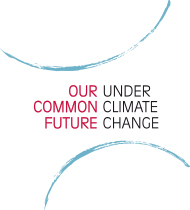Our Common Future Under Climate Change
International Scientific Conference 7-10 JULY 2015 Paris, France
- Home
- Side Events
- 97 What geological CO2 storage can bring to mitigating climate change
WHAT GEOLOGICAL CO2 STORAGE CAN BRING TO MITIGATING CLIMATE CHANGE - UK RESEARCH PERSPECTIVE
Overview
Organizers :� CO2GeoNet - BGS (British Geological Survey), Vice chair of co2geonet ExCo, Nottingham, United Kingdom, UK Carbon Capture and Storage Reserach Centre, Edinburgh, United Kingdom
Date : July 1st, from 9am to 6pm
Location : Epworth room, The Wesley, Euston House, 81-103 Euston Street, London, Greater London, NW1 2EZ
Expected number of participants : 1-50
Nature of participants : UK CO2 storage stakeholders
Keywords : CO2 storage, UK, SME, Collaboration
Keynote speaker: The keynote presentation will be given by Will Lochhead, Department of Environment and Climate Change, London, United Kingdom
Summary
In order to achieve the 2 degrees scenario (2DS) described in the IEA Energy Technology Perspectives Report, a range of urgent actions are required as set out in the IPCC�s Fifth Assessment Report (AR5). Carbon dioxide capture and storage (CCS) is highlighted as an important option for reducing greenhouse gas emissions, in fact 85% of scenarios in AR5 require negative emissions via bioenergy with CCS in order to achieve the 2DS. Geological storage involves safely trapping carbon dioxide (CO2) deep underground in porous and permeable rocks over extremely long timescales to avoid this CO2 being emitted to the atmosphere. Geological storage has been demonstrated at a number of sites across the world, including the Sleipner and Snohvit sites in the Norwegian sector of the North Sea. Potential options for storing CO2 deep underground in the UK offshore have been assessed over the last 20 years. Most recently, through the �CCS competition� coordinated by the UK Department of Environment and Climate Change (DECC), Front End Engineering and Design (FEED) studies for two projects with storage in the UK sector of the North Sea have been supported. As these demonstration projects move forward, new challenges present themselves that require additional research in order to refine various aspects of geological storage technology. UK research partnerships have a key role to play in responding to these challenges.
The aim of this networking event is to increase dialogue between key stakeholders and develop new research partnerships by drawing together active participants in the UK CCS arena. This will include inter alia, DECC, research institutes, universities involved in CO2 storage research, industrial companies investigating opportunities to operate CO2 transport and storage infrastructure in the UK, SMEs and NGOs. The event participants will consider the latest science and technology behind the multidisciplinary challenges of implementing CO2 storage in a range of geological and geographical contexts. The proposed UK demonstration projects will be used to highlight research needs that can be tackled by UK research partnerships. The focus will be on connecting researchers, SMEs and industrial players working to get CO2 storage off the ground in the UK. Positive aspects of CCS for the UK such as job creation and new products for the emerging CCS market will be considered. Societal needs that must be satisfied if CCS is to be implemented in the UK will also be considered. The outcome of the event will be identified research needs for the demonstration projects and new research partnerships.
The format of the event will be a one day workshop/networking event with presentations from key stakeholders to stimulate discussion on research needs of the �CCS competition� demonstration sites and the role of UK research partnerships. This will include potential including academic/research-SME-industrial partnerships in the UK CCS technology development arena.
Outline of event: The event is divided into four sessions:
1) Context: What does CO2 storage means for the UK and how is it being supported through public and private funding? DECC and key stakeholders will provide context to the UK CCS scene, setting out regulatory support and the business case for CCS.
2) Research and Development (R&D;) needs: Industrial partners will set out identified research needs and opportunities for the UK players (national and international opportunities). Topics could include inter alia: CO2 storage - research needs to support geological storage in offshore UK; CO2 storage - international opportunities for the UK.
3) UK Research: Academic and research institutes as well as selected SMEs will give lightning talks (5 minutes each) to set out cutting edge research and relevant technology developments undertaken at their institutes that could support� UK demonstration operators. This could also include aspects of effectively communicating CCS to local stakeholders since this is also needed to deploy CCS.
4) Discussion and networking time will foster new partnerships and identify potential new opportunities with particular attention to recent funding calls for technology development.
The aim of this networking event is to increase dialogue between key stakeholders and develop new research partnerships by drawing together active participants in the UK CCS arena. This will include inter alia, DECC, research institutes, universities involved in CO2 storage research, industrial companies investigating opportunities to operate CO2 transport and storage infrastructure in the UK, SMEs and NGOs. The event participants will consider the latest science and technology behind the multidisciplinary challenges of implementing CO2 storage in a range of geological and geographical contexts. The proposed UK demonstration projects will be used to highlight research needs that can be tackled by UK research partnerships. The focus will be on connecting researchers, SMEs and industrial players working to get CO2 storage off the ground in the UK. Positive aspects of CCS for the UK such as job creation and new products for the emerging CCS market will be considered. Societal needs that must be satisfied if CCS is to be implemented in the UK will also be considered. The outcome of the event will be identified research needs for the demonstration projects and new research partnerships.
The format of the event will be a one day workshop/networking event with presentations from key stakeholders to stimulate discussion on research needs of the �CCS competition� demonstration sites and the role of UK research partnerships. This will include potential including academic/research-SME-industrial partnerships in the UK CCS technology development arena.
Outline of event: The event is divided into four sessions:
1) Context: What does CO2 storage means for the UK and how is it being supported through public and private funding? DECC and key stakeholders will provide context to the UK CCS scene, setting out regulatory support and the business case for CCS.
2) Research and Development (R&D;) needs: Industrial partners will set out identified research needs and opportunities for the UK players (national and international opportunities). Topics could include inter alia: CO2 storage - research needs to support geological storage in offshore UK; CO2 storage - international opportunities for the UK.
3) UK Research: Academic and research institutes as well as selected SMEs will give lightning talks (5 minutes each) to set out cutting edge research and relevant technology developments undertaken at their institutes that could support� UK demonstration operators. This could also include aspects of effectively communicating CCS to local stakeholders since this is also needed to deploy CCS.
4) Discussion and networking time will foster new partnerships and identify potential new opportunities with particular attention to recent funding calls for technology development.
More information
For more details including the workshop agenda and to register for this event, please go to: https://ukccsrc.ac.uk/news-events/events/what-geological-co2-storage-can-bring-mitigating-climate-change-uk-research
Key outcomes
One of the key aims of the meeting was to connect researchers, Small-Medium Enterprises (SMEs) and industrial players working to accelerate CCS in the UK in order to increase dialogue and to support the creation of new research partnerships.
This meeting achieved increased dialogue between researchers, storage site operators/developers and SMEs. Discussions on potential new research partnerships to address the technology improvements presented by the storage operators/developers also took place.
Reports
In the enclosed document, you will find the summary of outcomes of the side event and the main messages from the workshop.



